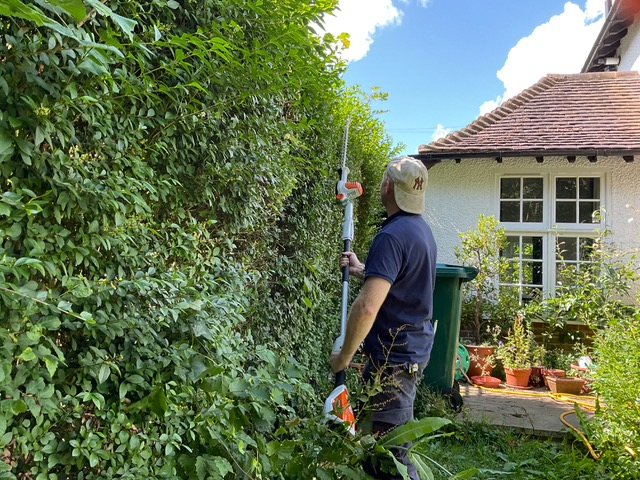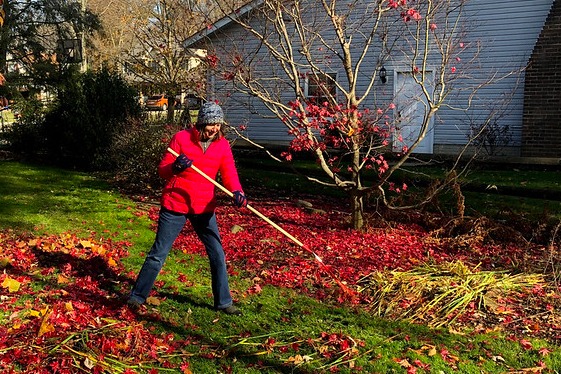The curse of petrol tools in the garden
These smelly machines are assaulting our ears, and noses. Worse, the pollutants they emit have been linked to cancer, heart disease and asthma. Barry Millington issues a rousing call to go electric in the garden

Ollie Gael cutting hedges without excessive noise or pollution. Photo: Barry Millington.
Spring comes, green shoots appear, the hedges need a trim and within days the Suburb has become a war zone. Contract gardeners are sent out to terrorise us with horticultural bazookas, polluting the environment and deafening anybody foolish enough to welcome the spring with their windows open.
Often two or three of these operators open fire simultaneously, explosions ricocheting round the buildings. Thought you’d have a quiet coffee in the garden with a friend? Forget it. After an hour or more of this, there’s a blissful silence but it’s only a temporary ceasefire. The hedge trimmers are abandoned and it’s on to the leaf blowers.
Everybody knows they’re only blowing the leaves from one garden to another. Next day another lot will blow them back again. Never mind: job done. They’re off to shatter the peace around the corner.
Why do we stand for this? They’re making fools of us and it’s not necessary. Our gardener, Ollie Gael – a real pro with 40 years’ experience – recommends the Stihl HLA 86 Cordless Long Reach Hedge Trimmer (RRP £429). It’s virtually soundless from a short distance away and spare batteries can be carried if they’re in use all day.
Ollie doesn’t use a leaf blower, believing them to be unnecessary and inefficient, as well as anti-social. Raking is an ecologically-preferred alternative and has the advantage of not sounding like a heavy-artillery assault. The noise emitted by petrol-powered leaf blowers can be over 100 dB. Employers in the UK are legally required to provide hearing protection for workers subjected to more than 80dB and so it isn’t surprising that hearing loss and tinnitus are common among users of this type of petrol-powered gardening equipment. And what about residents innocently going about their daily lives?
Nor is it just our hearing we need to be concerned about. A commercial petrol leaf blower generates as much pollution as driving a small car about 1100 miles, according to the California Air Resources Board. Research conducted in 2019 by a journalist for the respected American periodical, The Atlantic, established that the two-stroke engine found in many leaf blowers is vastly dirtier and less fuel-efficient than the four-stroke engines of most modern cars ‘because by design it sloshes together a mixture of gasoline and oil in the combustion chamber and then spews out as much as one-third of that fuel as an unburned aerosol’, ie as pollutant-bearing exhaust. These pollutants have been shown (by Adrienne Bernhard in a well-researched 2018 article in the Wall Street Journal) to be linked to cancer, heart disease and asthma.
As well as endangering the health of humans, leaf blowers disturb the insects on which our wildlife depends, destroying habitats and ‘precious soil’, leaving the air toxic and dangerous to breathe. If you can smell the fumes of these pestilential machines as you walk past, you’ve already ingested a dangerous dose. If you have children or grandchildren, are you happy to expose them to this poison? To risk shortening their lives or blighting them with cancer?

Photo: dchrisoh/Flickr
Electric is safer and better
So, what can we do? More than 100 cities across America, and many more in Europe, have already banned petrol-powered leaf blowers. In the UK, more and more local councils are under pressure to phase out petrol machinery in favour of electric. Efficient electric machines are now available, safer for both gardeners (quieter and with low vibrations for hand comfort) and residents, and generally cheaper than petrol-powered ones (they certainly require less maintenance).
Both the Residents’ Association and the Suburb Trust support the move towards electric. Simon Henderson, Chief Executive of the Trust, tells me they are considering how to encourage a more environmentally responsible approach in their own contracts. Just think how much more pleasant and safe the Suburb would be without these noisy, noxious machines. This is a battle we can win. Where Hampstead Garden Suburb leads, the world will surely follow!
Want to find a quiet gardener? Names are in the gardeners section of the HGS Master Tradespersons list, available to all RA members.
Want to tell us about a quiet gardener so other HGS residents can use him or her? Please enter details in the web form below.
Article created:22nd September 2023 Last updated:22nd September 2023

